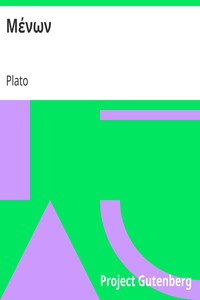Μένων by Plato
"Μένων" by Plato is a philosophical dialogue written in the late 5th century BC. The work primarily features Socrates and his conversation with Meno, wherein they explore the nature of virtue and whether it can be taught or if it is an innate quality. This exploration delves into fundamental questions about knowledge, understanding, and moral philosophy, establishing a critical foundation for subsequent discussions on ethics. At the start of the dialogue, Meno
asks Socrates whether virtue can be taught or if it is acquired through practice or is inherent by nature. Socrates admits his own ignorance about the essence of virtue and proposes they investigate the concept together. The conversation evolves as they examine various definitions of virtue, with Meno suggesting different forms tailored to men, women, and different types of roles. This leads to a deeper inquiry into whether all virtues share a common essence or substance, and the discussion remains focused on understanding virtue's fundamental nature rather than arriving at a definitive conclusion in this opening segment. (This is an automatically generated summary.)
Read or download for free
| How to read | Url | Size | |||
|---|---|---|---|---|---|
| Read now! | https://sendtokindle.compellingsciencefiction.com/ebooks/34881.html.images | 208 kB | |||
| EPUB3 (E-readers incl. Send-to-Kindle) | https://sendtokindle.compellingsciencefiction.com/ebooks/34881.epub3.images | 103 kB |
Send
to kindle email: |
||
| EPUB (older E-readers) | https://sendtokindle.compellingsciencefiction.com/ebooks/34881.epub.images | 105 kB | |||
| Kindle | https://sendtokindle.compellingsciencefiction.com/ebooks/34881.kf8.images | 215 kB | |||
| older Kindles | https://sendtokindle.compellingsciencefiction.com/ebooks/34881.kindle.images | 196 kB | |||
| Plain Text UTF-8 | https://sendtokindle.compellingsciencefiction.com/ebooks/34881.txt.utf-8 | 171 kB | |||
| Download HTML (zip) | https://www.gutenberg.org/cache/epub/34881/pg34881-h.zip | 101 kB | |||
| There may be more files related to this item. | |||||
Similar Books
About this eBook
| Author | Plato, 428? BCE-348? BCE |
|---|---|
| Translator | Papantoniou, Ch. |
| Title | Μένων |
| Alternate Title | Meno |
| Note | Wikipedia page about this book: https: //en.wikipedia.org/wiki/Meno Wikipedia page about this book: https: //es.wikipedia.org/wiki/Men%C3%B3n |
| Note | Reading ease score: 93.4 (5th grade). Very easy to read. |
| Credits | Produced by Sophia Canoni. Book provided by Iason Konstantinides |
| Language | Greek |
| LoC Class | B: Philosophy, Psychology, Religion |
| LoC Class | PA: Language and Literatures: Classical Languages and Literature |
| Subject | Socrates, 470 BC-399 BC |
| Subject | Virtue -- Early works to 1800 |
| Category | Text |
| EBook-No. | 34881 |
| Release Date | Jan 8, 2011 |
| Copyright Status | Public domain in the USA. |
| Downloads | 89 downloads in the last 30 days. |
| Project Gutenberg eBooks are always free! | |

